Economy
Name of the game
By Zhao Yanrong and Xie Chuanjiao (China Daily)
Updated: 2011-06-24 17:31
 |
Large Medium Small |

Qingdao banks on successful brands to stay competitive
The neon lights displaying global brands stand out from the skyscraper shopping malls at night in Qingdao, giving the coastal city in Shandong province a veneer of internationalization.
But Qingdao residents are also suitably proud of local labels like Haier, Hisense and Tsingtao Beer, names that have helped pushed the "Made in China" brand.
Haier is a top domestic appliances brand, while Qingdao Brewery is listed as one of the top 10 brewery brands worldwide for its Tsingtao Beer. Hisense is the only company with three "Top China Brands" nationwide.
"We were sure to promote our own brand from the very beginning, because without a brand, we could only work for other companies and remain at the bottom of the industry chain," China Business News quoted Zhang Ruimin, founder, chairman and CEO of Haier Group, as saying.
Haier says it has focused on quality since it was established in 1984 to help build a competitive reputation abroad. The brand is now in more than 160 countries worldwide.
Zhang said a company without brand presence will lack the potential to develop.
"Without brand building, a country will find it hard to practice sustainable development."
In November 2005, Qingdao was named a Famous Brand City of China. It has received the accolade a few times.
|
||||
"From brand-name products, brand-name enterprises, to brand economy, we have framed a distinct 'Qingdao phenomenon'," says Xia Geng, mayor of Qingdao. The success of Qingdao's brand building benefits from the city's openness, high quality and outstanding entrepreneurs.
The Qingdao government selects 30 products for brand building programs and supports them for technological breakthroughs every year.
With the support of the local government, Hisense succeeded in developing a VPE1X video frequency processor chip in 2005 for use in taking numerous video signal formats and converting them to a high signal processing rate. The "Hisense Chip" ended the years that China could not create its own chips.
"Companies in Qingdao have improved their ability to innovate by following a strategy of international standardization," Xia says.
In the past five years, brand-name enterprises from Qingdao led or participated in formulating nine international industry standards, which enhanced the city's role in international brands.
"Since the start of the new century, we have followed a new trend in the brand economy, from major entrepreneurs to the industrial chain, and from industry clusters to the industrial base."
In the last decade, seven industry clusters including the domestic electronics appliances and auto sectors have taken shape and contributed more than 80 percent to local industry output in those fields.
"We encourage our brand-name enterprises to build deep-rooted cooperation with transnational corporations and to purchase foreign famous brands; to develop overseas marketing networks and establish research and development centers in other countries," Xia says.
Haier set up the Haier-Ruba Economic Zone in Pakistan in 2006. The zone is considered the first Chinese industrial zone built overseas.
In 2009, Haier also acquired a 20 percent stake in Fisher & Paykel, the largest household appliance company in New Zealand.
The domestic appliance giant has established a global network with logistics, capital and information flows.
It also set up a "three-in-one" system that includes localized design, production and promotion in six international markets including the Americas, Europe, South Asia, East Central Africa, Asia-Pacific and ASEAN.
"We also develop the corporate culture into service and culture industries, and create brand events such as the Qingdao Beer Festival," Xia says.
The annual beer festival in August attracts millions of visitors to Qingdao and creates a huge demand for local beer. Germans brought the brewing culture to Qingdao 100 years ago by starting the first beer factory.
Qingdao will also celebrate the 120th anniversary of the city's establishment this year. The city is setting its goal at a higher level - to become a city of brand names in China and world.
Yang Xilun, chief brand architect of CEO Brand Management Co Ltd, a brand building consultancy based in Beijing, believes the goal is ambitious but achievable. For example, about 90 percent of the passengers of Singapore Airlines have never landed in Singapore but the airline still brings the Singapore brand to the rest of the world, Yang says.
"Qingdao needs more products, activities and people to make the city's name heard by the world, like how Tsingtao Beer does."
| 分享按鈕 |



